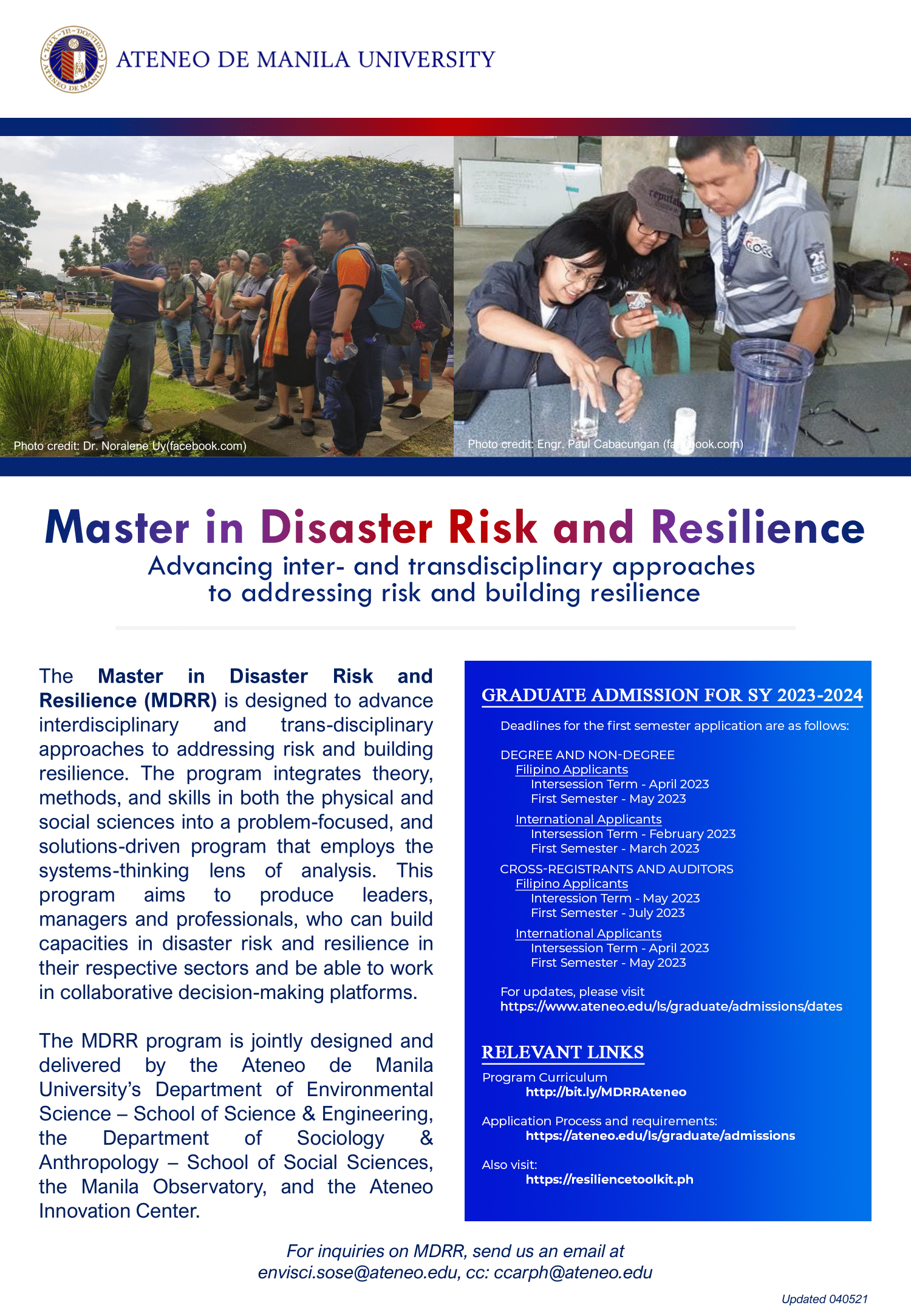Advancing interdisciplinary and transdisciplinary approaches to addressing risk and building resilience
TOOLKIT / TOOLS / CAPACITY BUILDING / MDRR
Master in Disaster Risk and Resilience (MDRR) program
The Master in Disaster Risk and Resilience (MDRR) is designed to advance interdisciplinary and transdisciplinary approaches to addressing risk and building resilience. The program integrates theory, methods and skills in both the physical and social sciences into a problem-focused and solutions-driven program that employs the systems thinking lens of analysis. This programs aims to produce leaders, manager and professionals who can build capacities in disaster risk and resilience in their respective sectors and be able to work in collaborative decision-making platforms.
The MDRR program is jointly designed and delivered by the Ateneo de Manila University’s Department of Environmental Science – School of Science & Engineering, the Department of Sociology & Anthropology – School of Social Sciences, the Manila Observatory, and the Ateneo Innovation Center.
The MDRR program ranked 39th in the Eduniversal Best Masters Ranking 2021 in the area of Environmental Security. Read more at ateneo.edu
For more information about the MDRR program, visit bit.ly/AteneoMDRR
For more information about the application process, visit How to Apply for a Graduate Degree Program of the ADMU Office of the Associate Dean for Graduate Programs (OADGP) website.
Related Links:
1. ADMU’s MDRR program regarded among Far East Asia’s best

Featured Works
Canaleta, L. (2020). Integrating Resilience in the Berde Rating System and in the Philippine Green Building Code.
Dela Merced, P.A. (2020). The Formulation of Monitoring and Evaluation Indicators for the Rehabilitation and Recovery of Marawi City.
Labrador, S.N. (2020). Assessing Health Vulnerability to Climate Change and Public Health Interventions in Batangas Province.
Lee, Y.A. (2020). Climate Information for Resilience Building: Communications Criteria for Women Farmers in Naga City.
Miranda, R.A. (2020). Order in Disasters: Assessing the Reliability and Effectiveness of Incident Command System in the Philippines.
Perez, J. (2020). Disaster Risk Reduction Demystified: Localizing the Disaster Risk Indicators in the Philippines.
Que, K.B. (2020). The Effect of Climate Hazards on Labor Market in the Philippines.
Tandoc, E. (2020). From Disaster Preparedness to Technology Driven Disaster Resilience: Installation of Clean Water System in Barangay San Andres, Cainta, Rizal.
Tapnio, C. (2020). Village Level Green-gray Management Strategies for Coastal Protection: The Case of Libjo, Polillo, Philippines.
Urcia, F.E. (2020). New Translations for the Ivatan House: Integrating Resilient and Sustainable Measures for the Rebuilding of Heritage Houses in Itbayat, Batanes.
This policy brief compendium was a product of Master of Disaster Risk and Resilience capstone projects by the MDRR class of 2020. The production was carried out under the Coastal Cities at Risk in the Philippines: Investing in Climate and Resilience Project, with the aid of a grant from the International Development Resource Centre, Canada, and implemented by the Ateneo de Manila University, in collaboration with the Manila Observatory, Ateneo Innovation Center, and the National Resilience Council.
Contents:
- Integrating Resilience in the BERDE Rating System and the Philippine Green Building Code | Canaleta
- Formulation of Monitoring and Evaluation Indicators for the Rehabilitation and Recovery of Marawi City | Dela Merced
- Building Health Resilience Through a Multidisciplinary Disaster Risk Reduction and Management Approach | Labrador
- An mga Kababaehan iyo an mga Kampeon kang Pag-umá: Using Communication in Leading Communities to Climate-Resilient Agriculture Practices | Lee
- Order in Disasters: Institutionalizing Incident Command System (ICS) in the Philippines | Miranda
- Disaster Risk Reduction Demystified: Localizing the Disaster Risk Indicators in the Philippines | Perez
- Integrating Disaster Response in Business Operations to Reduce Impacts on Employees | Que
- Special Brief: Adopting business continuity management in establishments as part of a “better normal” approach toward building resilience against disasters in the Philippines. | Que and Urcia
MEDIA
STORIES
AIC, MDRR, BTKI training for solar-powered clean water systems
February 24, 2019 • MDRR students join AIC in training BTKI on how to assemble and install the low-cost, solar-powered water system. 🔗Read More

DILG lecture on risk governance for MDRR students
February 20, 2019 • DILG Undersecretary Marivel C. Sacendoncillo discussed the future of risk governance and resilience-building 🔗Read More

For more stories, visit coastalcitiesatriskph.com.
2,352 total views
